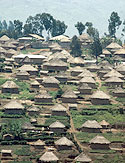Postcards from the Edge

For nearly a decade, women in the eastern Congo have endured unimaginable acts of
sexual cruelty, leaving them shamed, abandoned by their families, shunned by their
villages, and ignored by the world. Last December we asked readers to write notes of
support inviting these women to tell their stories. Here, a few of their responses,
encompassing both the horror of their experiences—and the glimmer of hope
an extraordinary organization is giving them.
Furaha Mirindi, 34, single mother of sevenI am from Kavumu. I got married when I was 15 years old and he was 18. We did not have an official ceremony, but we lived together as a married coupled. Together we had 6 children. While I had no formal educational training and cannot read and write, I successfully ran a small business selling peanuts and palm oil to feed my family before we were directly affected by the war.
In 2002, there was a great deal of insecurity in Kavumu. My family left the village for a more secure place nearby. The village chief gave us temporary refuge. The first night we spent in the new house, we were attacked. There were more than six military men that entered the house that night. My mother, my younger sister and my sister-in-law were all raped. I was raped by at least three of them. I cannot remember. I was numb. I tried to stop them, not only because I did not want to be invaded, but I did not want them to rape me in front of my children. In my struggle with them, they hit me on my right eye, which is now damaged. After the incident, I spent six months in the hospital because of my eye and other injuries. In addition to the physical damages of the rape, I got pregnant. I gave birth without even realizing it. At the time I was in so much pain physically and emotionally that I could not distinguish the pain from my eye and the rape from the pain of giving birth. The child had to be forced out of me because I did not have the courage or the energy to push. Ironically, the child is born with a damaged left eye, similar to the damage of my right eye. The doctor says it is because the position I was in during the eight months I was in the hospital. It seems like a curse to me.
My husband supported me throughout the time I was in the hospital. He sold all of our possessions to pay for my medical bills. But he left sometime after the child was born. He left me because he simply could not deal with the cost of the aftermath. The burdens were too heavy for him to carry. He told me that I had made him poor. The little girl I gave birth to after the rape is always sick. She needs more than we can provide. Although we were not officially married and he had never paid the customary bride fees, before he left me he went to my family and paid the bride fees and told them that he was returning their daughter. He said that he no longer has the means and resources to continue to support me.
My little girl is now one and a half years old. She cannot walk, crawl or sit up. I came to Bukavu with the hope that the Centre for Handicapped Children would take this child and treat her and provide for her. I am not able to attend to her needs. I love my baby even though she is a product of being brutally raped. I would like for her to have a normal childhood, to be like other children, and to one day walk and play. The Centre did not take my baby they only take handicapped orphans. I hope to find an opportunity to care for my children, all of them. I feel like I have no value. When I see my child crying because she is hungry and there is nothing that I can do about it, it's painful. It hurts at the core of my being. Every day is more and more difficult, especially with this baby. While I am no longer active in a church like I used to be, I continue to put my faith in God. I have to believe that I will one day reconstruct my life and provide for my children and perhaps find a husband again.



